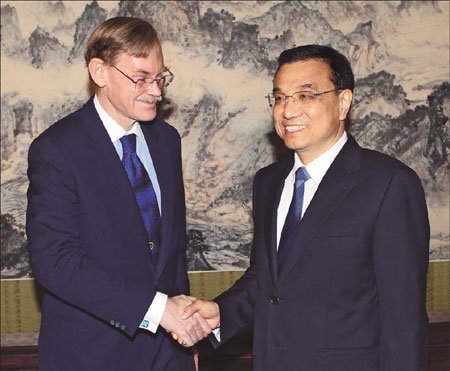Li promises stable growth
Updated: 2012-02-28 09:17
By Wei Tian and Cheng Guangjin (China Daily)
|
|||||||||
Vice-premier vows to maintain economic stability and innovation
BEIJING - China will promote "innovation and opening-up" to maintain long-term, stable and fast economic growth, Vice-Premier Li Keqiang said during a meeting with Robert Zoellick, the president of the World Bank, in Beijing on Monday.
 |
|
Vice-Premier Li Keqiang meets Robert Zoellick, the president of the World Bank, in Beijing on Monday.[Photo/China Daily] |
Li was speaking after the bank said in a report that China may become a high-income economy enjoying rapid growth over the next two decades if economic reforms were properly addressed.
"China is accelerating economic transformation, promoting innovation and opening-up - to ensure long-term economic growth, stable, balanced and relatively fast social and economic development," the vice-premier said.
He also said that the ongoing financial crisis had exposed the systematic problems of the global economy and called for joint efforts from the international community to tackle it.
Annual GDP growth for the world's second-largest economy will gradually decline from 8.6 percent during 2011-15 to 5 percent during 2026-30, a still relatively high level, a report coauthored by the World Bank and the State Council's Development Research Center estimated.
The report predicted that the service sector and consumption would replace industry and investment as the main engine of growth.
The report also said that in the future China will be using fewer primary commodities and energy and will therefore produce less pollution.
China's annual economic growth stood at 9.2 percent in 2011 and the World Bank predicted in a report in January that the rate was expected to slow to 8.4 percent in 2012.
The estimates for 2030 were made with the premise that China will further its reforms in enterprise, land, labor and finance.
In an alternative scenario presented in the report China would see further urban-rural income disparity and a sudden decline in the growth rate if the economy follows "past trends".
"But in fact, continuing with the past pattern would become increasingly difficult, if not impossible," the report said.
China was at a "turning point" and the need for deep reforms was urgent, analysts said in the report.
The country must make a number of changes, such as scaling back its vast and powerful State-owned enterprises, breaking up monopolies in strategic sectors and making it easier for small companies to access financing, they said.
"China could postpone reforms and risk the possibility of an economic crisis in the future or it could implement reforms proactively," according to the report.
Policymakers should also shift from focusing on the amount of growth to focusing on the quality of growth, the report said.
The assessment warned of possible risks faced by China over the next 20 years, including the risk of a hard landing.
It said China also faces challenges posed by an ageing and shrinking workforce, rising inequality, environmental stress and external imbalances.
"Chinese leaders have recognized that the growth model will need to be changed to accommodate new challenges," Zoellick said.
"During my meeting with local authorities, I can already feel the momentum of changes coming," Zoellick said, adding that he believed China will manage to avoid a hard landing in the near term and continue to be a major engine of the global economy.
His comments were echoed by Finance Minister Xie Xuren, who pledged that the government will continue to implement changes and accelerate economic restructuring, as well as focus more on employment.
Liu Shijin, deputy director of the development research center, said China has the capability to maintain long-term growth, but needs to alter its governmental functions, and redefine the relationship between the government, companies, and the market.
Also, "continuity of China's fiscal incentives will be a key issue for China in the next 20 years", Liu said.
The report urges China to "strengthen the fiscal system" and ensure that "local governments have adequate financing to meet heavy and rising expenditure responsibilities."
The currency will also play a major part, analysts said.
"China's growing influence on world trade, the size of its economy and its role as the world's largest creditor, make the internationalization of the currency inevitable," Vikram Nehru, the World Bank's former chief economist for East Asia and the Pacific, said.
Related Stories
Banking system of developed world 'insolvent' 2011-09-03 06:52
World Bank president to visit China 2011-09-01 15:38
ICBC is world' most profitable bank 2011-07-04 14:10
High growth to continue: World Bank 2011-06-09 07:40
- Li promises stable growth
- 'It's time for revamp of financial system'
- Investment in China's cement industry falls
- Home sales in Beijing rebound
- Poly Real Estate to increase land bank
- China mulls new green production laws
- China may launch rate cuts in Q2: report
- Beijing-Benz: Five-fold surge in production








